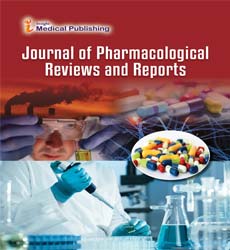Imaginary Views of Challenging Trends in Medicine and their Associated Challenges in Pharmaceutical Industry
Ahed J Alkhatib*
Department of Legal Medicine, Toxicology of Forensic Medicine, School of Medicine, Jordan University of Science and Technology, Jordan
- *Corresponding Author:
- Ahed J Alkhatib
Department of Legal Medicine
Toxicology of Forensic Medicine
School of Medicine, Jordan University of Science and Technology
Jordan
E-mail: ajalkhatib@just.edu.jo
Received date: Septemeber 19, 2017; Accepted date: October 03, 2017; Published date: October 10, 2017
Citation: Alkhatib AJ (2017) Imaginary Views of Challenging Trends in Medicine and their Associated Challenges in Pharmaceutical Industry. J Pharmacol Rev Rep Vol.1 No.1:1
Medicine has recently witnessed revolutionary phases and the term personalized medicine has emerged implying targeting the individual patient rather than a group of patients [1].
Personalized medicine implies the appropriate choice of treatment for an individual. The criteria of this choice involve age, gender, body mass index (BMI), ethnicity, diet and environment [2].
Another term, precision medicine has been introduced following personalized medicine. Precision medicine concerns with treatment choice and designing especial products for certain individuals [3].
The study of Turck [4] showed that the cost of oncology drug is increasing, and the increased cost of personalized medicine is a new trend.
In their conference study, Victor et al. [5] indicated that there is a lack of studies about new drug discovery/development on central nervous system (CNS) cancers. The reasons include several considerations such as economic factors and other reasons relating to pharmaceutical risk assessments, and regulatory limitations.
The treatment of hepatitis C virus (HCV) depends on genetic polymorphism and the concept of personalized medicine is applied [6,7]. It has been estimated that about half of HCV patients do not respond to therapy according to such considerations and no predominant genotype has been identified universally [7,8].
The treatment of HCV is highly costing and makes burden on the economy of developing country, particularly when it is associated with HIV [8].
The concepts of epigenetics bear the hope for developing new therapeutic strategies that may develop kinetic models to predict the outcome of diseases including HCV. It has been shown that the epigenetic control for expression of genes is a basic concept in carcinogenesis. Furthermore, hepatocellular carcinoma has involved certain molecular mechanisms that make a complicated picture for genetic and epigenetic factors. There are four main mechanisms in the field of epigenetics including methylation of DNA, histone proteins, chromatin remodeling, and noncoding RNAs [9].
We have found that the expression of certain proteins such as p53 and WT1 can predict the progression of acute myeloid leukemia (AML). Furthermore, the model we obtained may give us the ability to intervene in patients with this disease. We are planning to publish our findings as soon as possible.
Returning back to environment is helpful and may uncover new therapeutic properties. We have recently published an article in which Alhagi graecorum was effective in the treatment of Herpes Zoster (Shingles) [10].
In their study, Toporkiewicz et al. [11] highlighted the issues related to the introduction of systemic drugs in addition to approaching their targets. Targeting approaches bear the ideas of enhancing drug delivery through lowering toxicity associated with such drugs and reducing their side effects. Targeting depends on using the properties of cell- surface affinity directly or as being drug carriers. The appropriate selection of the right ligand includes its binding affinity. In this context, it is important to put focus on some ligands including monoclonal antibodies, antibody derivatives, peptides, and small targeting molecules.
In a recent study, we reported that estrogen and its receptors have therapeutic potential in a wide spectrum of diseases including infectious diseases, autoimmune diseases and cancers [12].
In conclusion, there must be creative solutions in pharmaceutical industry to cope with emerging trends in medicine. Critical challenges such as economic conditions must be searched for alternatives. Research in pharmacy has to be more activated based on herbal and other alternative solutions.
References
- Zhang XD (2015) Precision medicine, personalized medicine, omics and big data: Concepts and relationships. J Pharmacogenomics Pharmacoproteomics 6: e144.
- Jain KK (2009) Textbook of personalized medicine. Springer Science + Business Media LLC, Springer, New York.
- Völzke H, Schmidt CO, Baumeister SE, Ittermann T, Fung G, et al. Personalized cardiovascular medicine: Concepts and methodological considerations. Nat Rev Cardiol 10: 308-316.
- Turck R (2017) Oncology drug costs—The imaginary crisis? Ann Oncol 28: 427-431.
- Victor AL, Lauren EA, Timothy PH, Peter JT, Arvin CD, et al. (2016) CNS anticancer drug discovery and development: 2016 conference insights. Scottsdale, AZ, USA.
- Slev P (2012) Host genomics and HCV personalized medicine. Ann Clin Lab Sci 42: 363-369.
- Ilham TQ, Waleed HO, Ibrahim AA, Samar AB, Kennan MK, et al. (2012) Cross-sectional study of il28b polymorphisms amongst Saudi Arabian and British HCV patients. Eur J Sci Res 8: 1857-7881.
- Jane P, Messina IH, Abraham F, Anthony B, Graham SC, et al. (2015) Global distribution and prevalence of hepatitis C virus genotypes. Hepatology 61: 77-87.
- Rongrui L, Na H, Zongfang L, Fanpu J, Shiwen J (2014) Epigenetic mechanism involved in the HBV/HCV-related hepatocellular carcinoma tumorigenesis. Curr Pharm Des 20: 1715-1725.
- Ahed JA (2017) The extract of Alhagi graecorum in olive oil in the treatment of Herpes zoster (Shingles): A case report study. EC Microbiol 10: 137-140.
- Toporkiewicz M, Meissner J, Matusewicz L, Czogalla A, Sikorski AF (2015) Toward a magic or imaginary bullet? Ligands for drug targeting to cancer cells: Principles, hopes, and challenges. Int J Nanomed 10: 1399-1414.
- Ahed JA (2017) Molecular and physiological roles of estrogen receptor. J Pharm Pharmaceutics 4: 1-9.
Open Access Journals
- Aquaculture & Veterinary Science
- Chemistry & Chemical Sciences
- Clinical Sciences
- Engineering
- General Science
- Genetics & Molecular Biology
- Health Care & Nursing
- Immunology & Microbiology
- Materials Science
- Mathematics & Physics
- Medical Sciences
- Neurology & Psychiatry
- Oncology & Cancer Science
- Pharmaceutical Sciences
